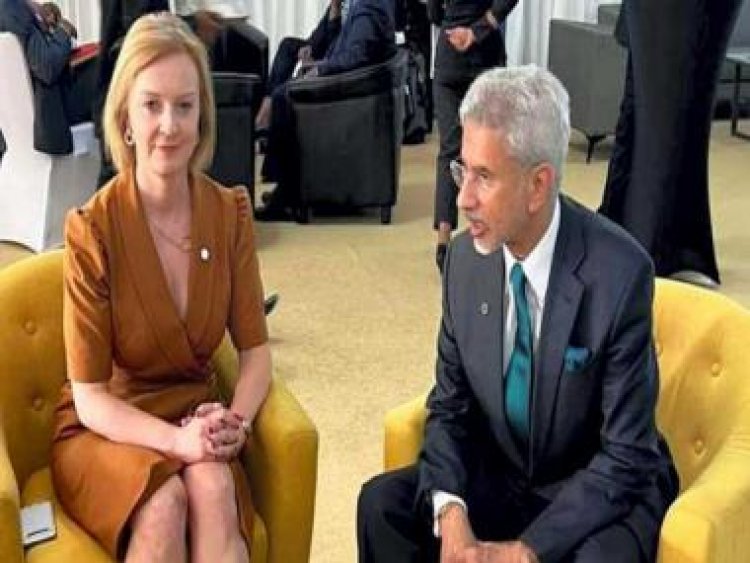When S Jaishankar had tutored UK PM-elect Liz Truss
When S Jaishankar had tutored UK PM-elect Liz Truss

New Delhi: Liz Truss has defeated Indian-origin former chancellor Rishi Sunak to be named the winner of the Conservative Party leadership contest and will now go on to formally take charge as British Prime Minister. She succeeds Boris Johnson.
Truss, the UK Foreign Secretary, was widely expected to become the third female British Prime Minister after 170,000 online and postal votes cast by Tory members. She polled 81,326 votes, compared to Sunak’s 60,399 in an election with a high turnout of 82.6 per cent, with 654 rejected ballots from a total of 172,437 eligible Tory voters.
As Truss wins the UK’s Prime Ministerial election, lets recall her recent visit to India during which she held bilateral talks with External Affairs Minister S Jaishankar.
During her India visit in March-end there was a sharp exchange between Jaishankar and Truss that highlighted the divergences between India and the UK on the issue of sanctions on Russia.
Also Read: Liz Truss defeats Rishi Sunak to be UK’s next prime minister
During the event, Jaishankar said that talk of sanctions “looks like a campaign” and that it was Europe which was purchasing more oil from Russia than before the war.
Both the leaders were attending the first India-UK Strategic Futures Forum, jointly organised by Indian Council of World Affairs and Policy Exchange. Responding to questions on India buying oil from Russia at discounted rates, Truss said: “I have outlined the UK’s approach to sanctions and the fact that we are ending our dependence on Russian oil by the end of this year… I think it is very important that we respect other countries’ decision about the issues they face.”
“India is a sovereign nation. I am not going to tell India what to do. What I have said is as a member of the UK Government that has signed up to the Budapest Memorandum. I feel a strong responsibility on behalf of the United Kingdom to take all the action we can, to support the people of Ukraine but that is not the same as going around telling other countries what to do,” Truss added.
After patiently hearing Truss, Jaishankar in his response highlighted that in the month of March, just before the Russia-Ukraine war started, Europe had bought 15 per cent more oil and gas from Moscow than it did the month before.
“If you look at the major buyers of oil and gas from Russia, I think you will find most of them are in Europe. We ourselves get the bulk of our energy supplies from the Middle East, about 7.5-8 per cent of our oil from the US in the past, maybe less than per cent from Russia.”
The Extrenal Affairs Minister further said, “When oil prices go up, I think it’s natural for countries to go out into the market and look for what are good deals for them. But I am pretty sure if we wait two or three months and actually look at who are the big buyers of Russian gas and oil, I suspect the list won’t be very different from what it used to be. And I suspect we won’t be at the top 10 of that list.”
Talking about how China will behave seeing Russian aggression, Truss said, “I have spoken to my Chinese counterpart Wang Yi. China is clear that it respects Ukraine sovereignty, and that is an important principle that as a member of the P-5 and a responsible nation, China needs to stick to. And therefore we shouldn’t see China supporting Russia’s actions in Ukraine.”
Jaishankar drew comparisons with the situation in Afghanistan in 2021 and went on to state how Europe was not affected the same way as India was due to the turn of events in August last year, when Taliban took over the country.
“I would say some of it also depends on proximity. Some of it depends on how strongly a particular country or society relates to what is happening. And again, the example I would use is Afghanistan… I think what we saw happening in Afghanistan last summer had a very, very strong impact here, certainly in India. I probably would say it didn’t have the same impact in Europe. I think people didn’t necessarily relate to, to the coming of the Taliban the same way. They didn’t identify with the people who are affected in the same way. So you know, the truth is that, many of us have similar or shared beliefs, values, but there is ability to relate, the ability to identify, some of it is proximity… the intensity of the reaction may not be the same all over the world,” Jaishankar said.
With inputs from agencies
Read all the Latest News, Trending News, Cricket News, Bollywood News,
India News and Entertainment News here. Follow us on Facebook, Twitter and Instagram.
What's Your Reaction?


























































